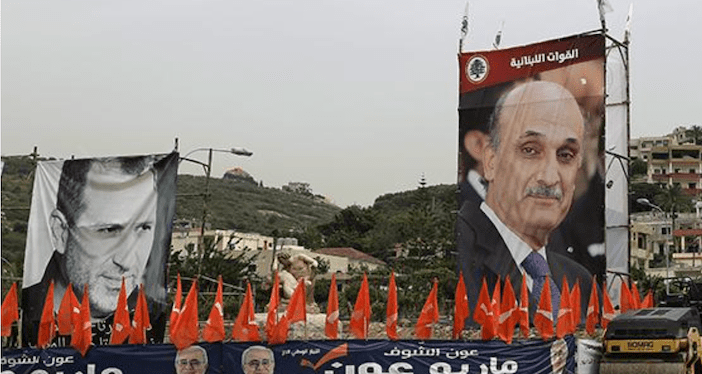No sooner had Lebanon’s elections been completed, than most observers warned that the country was in for months, if not longer, of political deadlock. With a presidential election scheduled later this year and no consensual candidate over which all sides can agree, we are in for an extended period of maneuvering as two men, Samir Geagea and Gebran Bassil, use all the means at their disposal to become president, or prevent others from doing so.
Their efforts will very likely lead nowhere, pushing everyone to search for a compromise candidate once the stalemate becomes untenable. But even this conclusion has problems of its own, as it will be very difficult to find such a candidate, other than perhaps the army commander, Joseph Aoun. Anyone who is anodyne enough to pass the filter of all the political parties will hit up against a Maronite Christian demand that the president must be representative of his or her community; and the commander is the single person, by virtue of the institution he leads, credible enough to be an exception to that rule. However, it is unclear whether Hezbollah would agree, given that the army played a decisive role in repulsing the deployment of Hezbollah and Amal gunmen around the Christian neighborhood of Ain al-Remmaneh last October.
Where does this leave us? One thing that will help answer the question is that Lebanon’s social and economic catastrophe is reaching untenable levels. The Lebanese pound fell last week to around LP36,000 to the $1.00, power stations are struggling to provide one hour of electricity to households, businesses, and state institutions a day, and water is being rationed in Beirut and Mount Lebanon because of this. The price of a monthly supply of electricity from neighborhood generators is often higher than the monthly salary of many Lebanese, because fuel prices have skyrocketed. Gasoline is being bought at global prices, which is beyond the reach of many people whose earnings are in pounds. The hot summer months are upon us, which will fray nerves even more. The Lebanese may be able to endure a great deal, but that fortitude is not open-ended.
In light of this, the ability of the political forces to focus on the presidency while ignoring the social and economic collapse of Lebanese society may be limited. That is not to say that things will be better. Hezbollah’s ability to force its allies, Bassil above all, into compromises to get the system moving again is blunted by the party’s unwillingness to take positions opposing its political partners. But nor is Hezbollah prepared to hold the country hostage to bring Bassil to power, as it did with his father in law, Michel Aoun, between 2014 and 2016.
In light of this, what we are likely to see is a sterile pas de deux. Geagea will say that that he has won more Christian votes than Bassil, therefore is the strongest Maronite candidate for the presidency. Bassil will reply that he has the largest parliamentary bloc, therefore that he is the strongest Maronite candidate. And there things will remain.
Constitutionally, the conditions for parliament to elect a president will not resolve anything. Neither of the candidates will get a two-thirds majority of the votes required to be elected in a first round of voting. In which case a second round will have to be held, during which the winning candidate needs an absolute majority of votes, meaning 65 votes in favor or higher. For the moment, neither Geagea nor Bassil has anywhere near that number of votes, even as both men face undeclared opposition even from some of their purported allies.
So, effectively Lebanon has a hung parliament today, without guarantees that a government will be formed in the interregnum between the parliamentary elections and the presidential election. In other words, the country may have no more than a caretaker government come the presidential election, which could be followed by a vacuum in the presidency. This represents a perfect storm of disarray and at a time when the country’s breakdown is accelerating.
Worse, if there is no agreement in Vienna to revive the nuclear deal with Iran, which seems more and more probable given President Joe Biden’s reported refusal to remove the Islamic Revolutionary Guard Corps from a U.S. terrorism blacklist, prospects for a regional understanding over Lebanon will fade. This will enhance the polarization gripping the country and make an agreement on a compromise candidate even more difficult.
In that context, Joseph Aoun seems to be the only figure capable of bridging the divide, given that he heads the single national institution that retains cross-sectarian respect. For him to be a candidate, however, parliament would need to amend the constitution, as a two-year hiatus is required before a Grade One civil servant can be a candidate for the presidency. That condition has been deftly overcome on several occasions, the last time in 2008 when Michel Suleiman took office. But for this to happen, Geagea and Bassil (as well as Hezbollah) would need to agree with such an arrangement, suggesting that if any consensus at all is to emerge, it will probably come after a long period during which both men gradually recognize that their presidential prospects are nil.
It’s difficult to see another outcome. Geagea and Bassil will neutralize each other, and both will team up to undermine weaker third candidates. When this game has caused enough anger in the country, as economic conditions decline even further, other political actors may intervene to try to negotiate a way out. If that fails, Lebanon’s second republic will be facing an existential crisis, and the political forces will have to recognize that their country’s social contract is dead.

